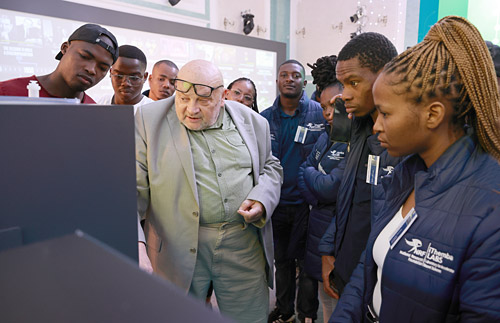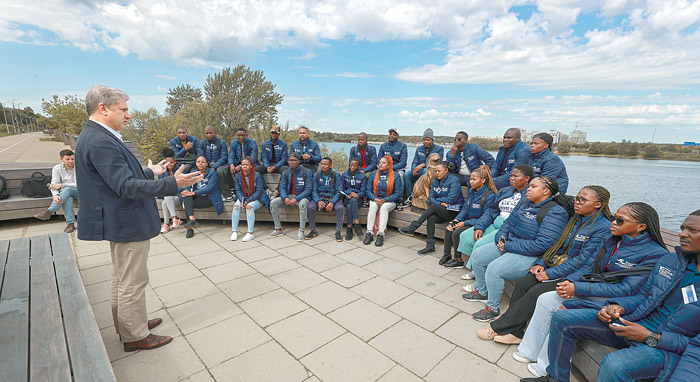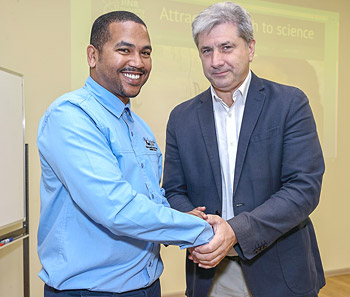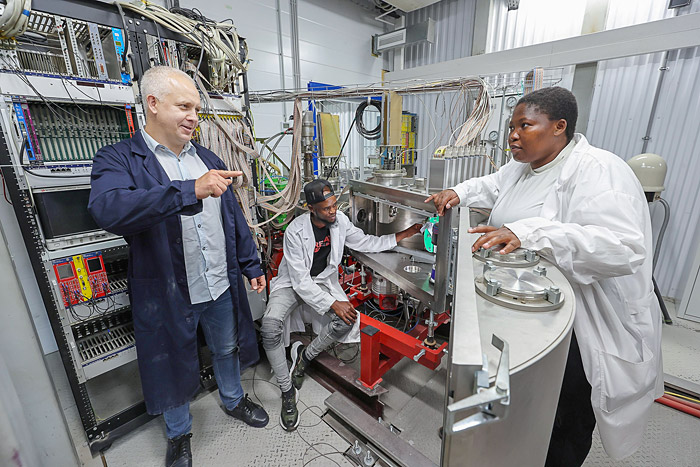
Electronic english version since 2022 |
The newspaper was founded in November 1957
| |
Youth and science
Practice is a springboard to the future
27 university students and young employees of research centres of the Republic of South Africa participated in the international student practice that was held on 7 - 23 June at the JINR University Centre.
 |
| The tour "JINR basic facilities" is led by Yu.A.Panebrattsev |
They learnt about the basic facilities and investigations carried out at the Institute, firstly, at an interactive exhibition in the Cultural Centre "Mir" and afterwards, in several laboratories. Later, work on selected educational research projects started, culminating in a final presentation and obtaining certificates.

Curator of engineering and technological projects of the JINR UC M.A.Nozdrin: We had six students working on two projects. Projects dedicated to electronics and microwave technology at this stage of the practice were united into one introductory one. We give analog electronics right from the basics: we explain what a resistor, capacitance, inductance is, we teach how to use a multimeter, an oscilloscope and to weld. All tasks at the workshop are implemented with current equipment, real radio components. The result of the practice was the construction of a simple bipolar transistor amplifier. During the practice, the participants studied the basic components required for its construction, learned what semiconductors were. In the part concerning microwave technology, we told what a microwave is, how it behaves on various inhomogeneities, what a matched wave is and so on. They learnt about the devices used in microwave technology, first of all, about a vector network analyzer, we taught them how to calculate the parameters of microwave systems theoretically and using the Volpert-Smith diagram.
Two students worked on vacuum and automation at the workshop. It first gives a simple, ready-made automation project based on the Siemens LOGO programmable controller. In the process of assembling a project, students learn about the design of project documentation, learn how to switch correctly. Further, within the framework of learning about the object of control and general education, a workshop on vacuum technology is given. Having obtained this knowledge, the students developed a project for remote control of the vacuum unit. In a full-fledged workshop, they would have to do a little more programming and end up developing a fully automated vacuum system that is pumped to working pressure at the touch of a button. Since there was not much time, only eight full working days, they managed to do only remote control.
N.S.Yushin (FLNP): The participants in our project were chemists by education. They turned out to be prepared, independent, we gave them tasks - they did everything themselves. We offered them to carry out sorption experiments. They worked with gadolinium - they checked the influence of parameters, the change in pH, the impact of various concentrations of the initial solution, time, temperature. They were trained in simulation according to the obtained data, built isothermal, kinetic models. Our project included undergraduate and graduate students. PhD students currently prepare their dissertations on topics related to ours: they develop testers for determining the content of metals in water and I think in the future, we will find some common ground with them.
 |
| D.V.Kamanin (UC) awarded Rudolf Nchod with the badge "Dubny" |
From my personal impressions of the first visit to JINR, what struck me the most was the infrastructure of the Institute, the world-class facilities, the availability of the facilities and all the necessary resources that every researcher can use if he wants to satisfy his passion for knowledge. This is different from South Africa, where during my studies I had to travel to various research centres in the country to carry out my research.
Sinovuyo Siyalo (U. Sisulu University): I currently work on my thesis at the university. I have gained a lot of knowledge here. Much was new to me, I had to make great efforts to learn everything. It was an interesting journey.
Remember Ayanda Madoncela (Western Cape University): I have already worked with detectors, scintillators, preparing my thesis. I also had some experience with inorganic scintillators and digitizers at my university in Cape Town. I chose the most suitable project for me in a certain area. During the practice, I worked with new data, gained new knowledge, the practice was very useful for me.

Work at FLNR. Grzegorz Kaminski with his students Remember and Sinowujo
Grzegorz Kaminski (FLNR): Participants of the practice are selected at a three-week winter school, in which JINR staff members take part. They hold seminars, practical courses, experts from South Africa also participate in the school. This practice is based on the basic knowledge that is given in South Africa and expands it. Students come to it to learn about our tasks, there is a narrow specialization. It is clear that the level of students is different, but I am pleased with the two participants who I worked on the project with. I would like to invite one of them, Remember Ayand Madoncela, he has already worked with detectors, he is literate, he has chosen a topic for himself, but we have to work with them. I have just discussed it with my colleague Arno Rossow that heads the South Africa group at JINR and is responsible for contacts.
- Did Arno by chance not participate in one of the previous practices? I thought, his face was familiar.
"Yes, in 2011, I participated in a similar practice at the JINR UC," Arno Rossou (FLNR) told his story. "After some time, I began to study at the magistracy in engineering, my supervisor was Vladimir Skuratov. I spent three months in Dubna, three months in South Africa and this went on for two years. I graduated from magistracy and worked. And then, on the recommendation of JINR, I went to Ulyanovsk, where an engineer was needed in a nanocentre to organize the work of a new high-tech company. They just could not find anyone with the required skills. I worked in Ulyanovsk for three years, then they sent me to work all over the world, I spent half a year in San Jose. And three years later, Vladimir Skuratov contacted me: "When will you do a doctorate?" he invited me here to help with my dissertation and to be the head of the South African group. I have been here since December 2017. My wife also works at the Institute. I can be a "source" for attracting new staff to JINR from South Africa.
The most important thing for students, it seems to me, is networking - useful contacts, communication through unofficial channels. The place where you can prove yourself is also important. And here it is easier to do than in my homeland, where you are just one of the crowd. And I learned about this practice in Dubna not from some promotional materials at my university, but from Alexander Nechaev, who then lectured in South Africa. That's how it all started."
Olga TARANTINA,
translated by Grzegorz KAMINSKI,
Yulia RYBACHUK, Olga TARANTINA,
photo by Igor LAPENKO